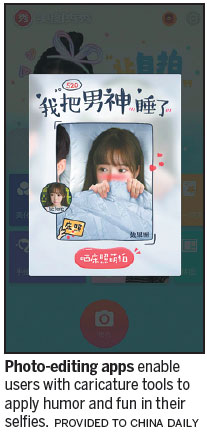Makeover apps now take over internet

Frequently zooming in and out to the same photo, Zhu Ziyi spends half an hour airbrushing her face to make sure that almost every pore is perfect before posting the photo on her different social media accounts to attract likes. For her "picky" roommate, it takes all the time before going to bed to get an ideal photo with a perfect face.
Having been in Paris for five years, Zhu and her Chinese roommate are photo-editing savvies compared with their foreign friends. They are quite good at removing pouches and stains, slimming faces, paling the skin and making eyes big and round.
"They don't have so many apps as we do. Most of my French friends only use filters offered by Instagram," says Zhu, 25, who works at an entertainment company in Paris. She has about 13 such apps on her phone.
She bought a selfie beauty smartphone recently, which cost her about 6,000 yuan ($876). The phone's camera can apply makeup automatically to everyone in the selfie photo.
"Asians, especially Southeastern Asians, pay more attention to their faces while the Westerners focus more on shapes, due to cultural differences," says Com Jiang, a product manager from MeituPic, a Xiamen-based photo-editing app.
MeituPic is one of the beauty-themed photo and video apps of Meitu Inc, which has about 500 million overseas users in 11 countries and regions, including the United States, India and Brazil, according to Meitu.
Jiang says in different nations, its app has developed localized features. For instance, in the US, they have tools to make people look tanned and to whiten their teeth.
"Users in the West love going to the gym, so they want to look healthy in photos," Jiang adds.
Dong Chenyu, an internet culture expert from Beijing Foreign Studies University, says that the standards of beauty between the East and West are different. From movies and TV shows, women are hot and sexy in Hollywood films while for a long time, cameras have been focusing on women's delicate faces in dramas and films in China.
Despite the various beauty standards, the pursuit of an ideal face still makes lots of similar faces.
Xie Qi, 25, who began using photo-editing apps in senior middle school, says she sometimes feels sick about photos with almost-the-same faces - oval-shaped face, pale skin and big eyes.
To make herself different from others on photos, Xie spends more time on photo altering and mastered various skills.
"We will develop tailored tools for users to look different and with their own personalities. That's a future endeavor, more natural and more personalized," says Jiang from MeituPic.
Apart from making people look beautiful, photo-editing apps now develop entertaining tools for people to make funny photos, which is very popular in Asia where the "cute culture" is deeply rooted, says Jiang.
With the technology of artificial intelligence, people can be pictured like caricatures of different styles.
Bunny and cat ears, sunglasses, funny beards and cute slogans are common to see in photos posted on social networks among the young in Asia.
Chen Ye, 29, a bank accountant in Shanghai, says she has seen a rise of friends posting photos with cat ears and whiskers since last year.
Even her boss' daughter, an 8-year-old primary student, is a big fan of such cute tools of photo-editing apps offered by various companies.
"Although it's a little bit childish, I love it. Very funny," says Chen, who is a die-hard fan. She even used such cute tools to help edit her mother's photos.
Jiang says the entertainment function of MeituPic is now more popular and a new trend in Asian market after users have used its beauty function for years.
"To be beautiful and to be funny are parallel functions for app developers, " says Jiang.
Since January, MeituPic has launched its caricature tool across the world. Some stars and celebrities post their caricatured photos on Instagram and Facebook, which attracted lots of followers and went viral on social media.
The caricature tool even helped MeituPic climbed to top of the app list within weeks in many countries, according to Meitu.
"The entertainment function is to allow users to collectively take part in a funny activity. Asians are going forward while the Westerners are catching up," Jiang says.


















